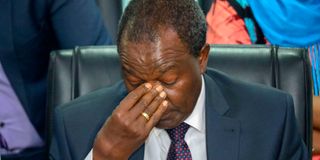You can’t tax yourself out of debt

National Treasury and Economic Planning Cabinet Secretary Njuguna Ndung’u. We are yet to realise that the level of taxes has increased to a point where the impact on effort now outweighs the value to the Exchequer.
Kristalina Georgeava, the managing director of the International Monetary Fund (IMF), was at State House, Nairobi, to hold discussions with President William Ruto and his economic advisers—including the National Treasury Cabinet Secretary, Prof Njuguna Ndung’u, Prime Cabinet Secretary Musalia Mudavadi, the Principal Secretary to the Treasury, Dr Chris Kiptoo, and members of the Dr David Ndii-led Council of Presidential Council of Economic Advisers.
As a matter of course, there was the usual photo op, where the President and his team arrange to take a photo with such important visitors.
I was surprised not to see the governor of the Central Bank of Kenya, Dr Patrick Njoroge, in the family photo for this notable event. Yet the two main clients of the IMF when the bean counters from Washington come calling are the finance minister and the central bank governor.
We were all waiting to hear the news from this meeting because—as we all know—the IMF remains at the centre of any plans to resolve our government’s tattered finances.
From her comments, it was clear that she was treading a very thin line between spooking domestic and international bondholders and creating uncertainty and talking straight and forthrightly about the current parlous state of the government’s finances.
What the IMF chief says about a country carries serious weight and consequences. We must remember that, in the IMF’s last Debt Sustainability Assessments report on Kenya, the fund rated Kenya as a country at “high risk of debt distress”.
I think the IMF chief calculated that in Kenya’s current circumstances, and against the backdrop of her visit, dwelling too much on the high risk of debt distress narrative was not going to be helpful.
The consummate diplomat, her assessment of Kenya was delivered in a polite and placatory language. The IMF chief exuded confidence about the economy, painting a rosy picture that was manifestly at odds with its official Debt Sustainability Assessment report on Kenya.
What I found silent and striking in her message was the following.
First, the IMF does not forecast a systemic debt risk in Kenya. The country is not among those that need debt restructuring. Secondly, the fund does not see Kenya facing difficulties in serving the $2 billion Eurobond payments that fall due next year.
Thirdly, even though the government has faced problems in accessing both international and domestic debt markets, the situation can be reversed by the government taking resolute actions.
Dose of the bitter pill
Yet her prescriptions for our economic maladies were the usual and typical conditions from IMF’s dose of the bitter pill: First, increase taxes higher than they are already. Her argument was that, because tax levels are currently at 17 per cent of gross domestic product (GDP), we still have headroom to increase it to 25 per cent of GDP.
Prescription number two: Increase interest rates on Treasury bonds higher than they are to make it possible for you to attract domestic investors. Number three: Allow the shilling to depreciate further and faster than the level where it is so as to attract more dollars and restore activity in the interbank market for foreign exchange.
It did not surprise that, within 24 hours of her departure from Nairobi, the National Treasury unveiled a Finance Bill with amendments that propose a squeeze on the living standards of the people as never seen before. The IMF believes that we can just tax our way out of a stagnant economy.
We all know that growth in this country has been stunted and its finances are in such a disquieting state because successive tax bills are framed and have been anchored for far too long to the illusion that, by imposing higher rates of tax, you collect more revenues, and that by enriching the government you enrich the nation.
I ask: Who benefits from tinkering with the tax bill that happens year in, year out, apart from tax consultants and lawyers?
We perpetually mistake amendment for improvement and change for progress. We have a tax regime that over-relies on consumption taxes that are regressive, attack the standards of living of the poor and serve to entrench inequality in our society.
Today, when Mike Sonko buys a kilogramme of cooking fat, he pays the same tax as Wanjiku in Kibra. When he pays for electricity, fuel or talk time, Mr Sonko pays VAT and excise duty at the same rate as the poor Wanjiku.
We are yet to realise that the level of taxes has increased to a point where the impact on effort now outweighs the value to the Exchequer. How else would you explain the fact that constant tinkering with the Finance Bill over the years has not led to commensurate increases and growth in the tax take?
Maybe we should go back to economics textbooks to read about the Laffer Curve.





